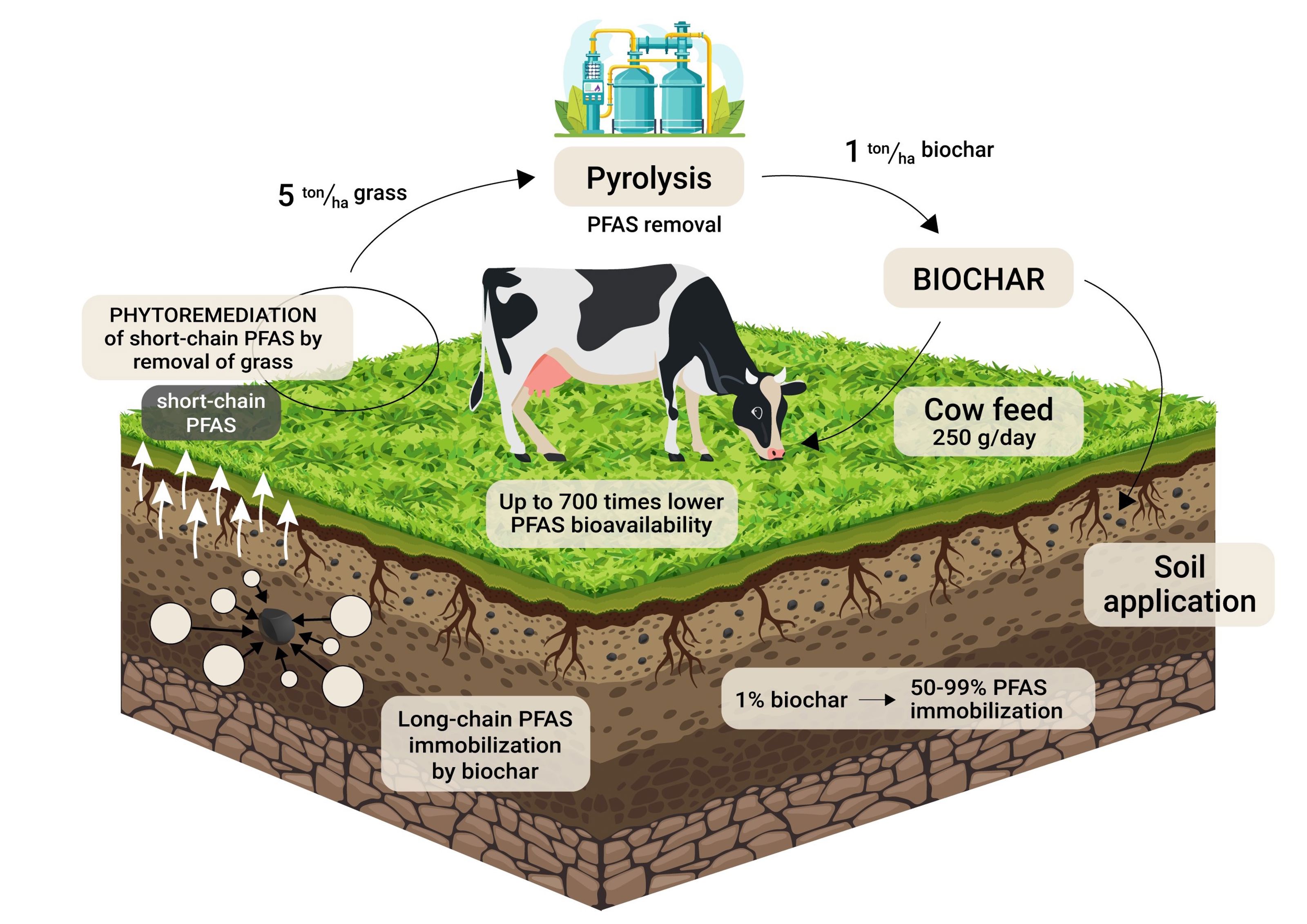NGI receives NOK 12 million to lead PFAS project
PFAS are the chemicals that never disappear. They are found in soil, water, animals, and humans—and represent one of our time's most serious environmental challenges. A new research project aims to turn the problem into a solution.

Illustration: The “virtuous cycle” in the VIRTUE project. Plants absorb PFAS from the soil, the biomass is purified through pyrolysis, and the resulting biochar binds the remaining PFAS and reduces levels in milk and meat.
The research project VIRTUE, led by Gerard Cornelissen at the Norwegian Geotechnical Institute (NGI), has been awarded more than NOK 12 million from the Research Council of Norway to develop a circular method for removing PFAS from soil, water, and food systems.
PFAS are used in everything from waterproof coatings and non-stick pans to firefighting foam and industrial processes. These compounds hardly degrade in nature. In Norwegian sewage sludge, PFAS levels have been measured up to 4000 times higher than the soil toxicity limit set in the Netherlands.
Cornelissen describes VIRTUE as an attempt to crack the code for a nature-based clean-up technology:
“We want to create a virtuous cycle. First, plants extract PFAS from the soil. Then we burn the contaminated biomass through controlled pyrolysis, destroying the compounds. Finally, we use the resulting clean biochar to bind any remaining PFAS in the soil,” Cornelissen says.
Turning a problem into a resource
VIRTUE combines three methods—phytoremediation, pyrolysis, and biochar—into a system that can be repeated year after year. The goal is a cheaper, greener, and more efficient clean-up than today’s practice of excavation and incineration, which both destroy the soil and cost millions per hectare.
The method will be tested in agricultural and peri-urban areas in Norway, where sewage sludge and firefighting foam have contributed to PFAS contamination. Researchers will also examine whether biochar can be added to animal feed to reduce PFAS uptake in milk and meat.

Gerard Cornelissen leads the VIRTUE research project at NGI. ( Photo: NGI)
Safe food and clean soil
“This is about more than the environment. PFAS can accumulate in the food we eat and in our bodies. Handling these chemicals safely is therefore both a health and a food safety issue,” says Cornelissen.
The project brings together partners, including NMBU, NTNU, NIBIO, FHI, SINTEF, and DTU in Denmark, and links soil, food, and public health research. Cornelissen holds a part-time professorship at NMBU in addition to his position as a technical expert in NGI’s Environmental Technology Department.
PFAS contamination occurs in soils worldwide, often where firefighting foam or sludge fertilizer has been used. By combining nature’s remediation power with advanced technology, the NGI team hopes to show that the problem can be tackled without further harming the environment.
“Our goal is to demonstrate that the solution doesn’t have to be destructive. We can actually use nature to clean up after ourselves,” says Cornelissen.
VIRTUE builds on years of PFAS research at NGI. Erlend Sørmo and Gerard Cornelissen received the 2024 Miljøringen Award for showing that adding just one percent of sludge-based biochar can prevent up to 99 percent of PFAS leakage. Recently, NGI researcher Michel Hubert also demonstrated that biochar made from sewage sludge can prevent “forever chemicals” from leaking into the environment—his doctoral work showed that the material can bind PFAS in soil for up to a hundred years.
“This knowledge forms an important foundation for the VIRTUE project, which aims to develop the next generation of solutions for safer soil and cleaner food,” Cornelissen concludes.
